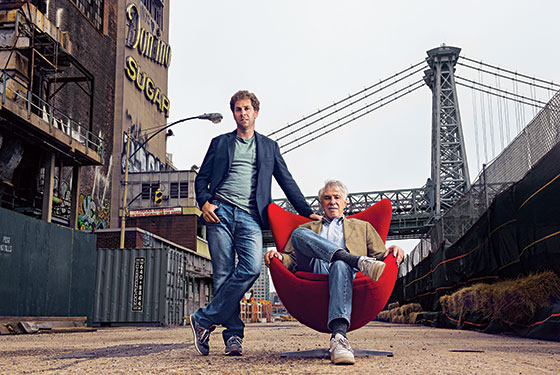Quotes from a lengthy piece on the Domino development...
http://nymag.com/news/features/walen...sfp=3335556299
The Flying Walentases
DUMBO dynasty devours Domino, extends Brooklyn domination.

By Gabriel Sherman
Jun 17, 2014
Quote:
Shortly before 10 a.m. on a late-winter Monday, Jed Walentas, the 39-year-old principal of the Two Trees Management Company, took a seat at the wide, U-shaped table in the ornate second-floor conference room at City Hall known as “the Cow,” shorthand left over from its original use as a meeting place of “the Committee of the Whole.” Across the table sat Mayor Bill de Blasio’s top emissaries to the real-estate industry: Carl Weisbrod, the newly appointed planning commissioner, and Alicia Glen, a former Goldman Sachs executive who was de Blasio’s pick to be deputy mayor for housing and economic development.
In a few days, the New York City Planning Commission was set to vote on Walentas’s $1.5 billion proposal to transform the shuttered Domino Sugar refinery on the Williamsburg riverfront into a Xanadu of parks, tech offices, shops, and—controversially—sleek apartment towers rising as high as 600 feet. The 3 million-square-foot project had been a locus of fevered community debate since 2004, when Domino ceased operations there after 148 years.
Walentas paid $185 million for the Domino site in 2012, after the previous owner, the Community Preservation Corporation, defaulted on its loans. It was the biggest deal of his career and one that heralded the next chapter for a New York real-estate clan. David Walentas, Jed’s father, had minted a billion-dollar fortune by transforming Dumbo, once a favored dumping ground for mob hit men, into a postindustrial playground, where a Walentas penthouse listing for $19 million drew interest from Jay Z and Ralph Lauren. Unlike Soho and Tribeca, where the classic city progression from decaying industrial buildings to artists’ lofts to condos for the superrich happened more or less organically, creating many fortunes along the way, Dumbo was the vision of one man.
It was a planned community in the heart of Brooklyn, bohemia by the numbers. A self-described dictator, David organized everything, providing free rent to galleries, restaurants, and chic shops like Jacques Torres. And he defended his little enclave fiercely. “If you were with me, we were friends. And if you were against me, you were my enemy,” David tells me. His many feuds over the years with city officials, community groups, rival developers, and even his buildings’ tenants were legendary. In 2006, he threatened to erect a steel barrier blocking windows in a condo building owned by Shaya Boymelgreen if Boymelgreen went forward with the purchase of a building Walentas coveted.
Perhaps David Walentas’s most notorious eruption occurred at a public meeting at Borough Hall, where he called Marianna Koval, then-president of the Brooklyn Bridge Park Conservancy, “a cunt” to her face. “Truth is my best defense: I did call her a cunt!” he tells me.
“He is a gross, rude man who’s used to having a lot of power,” Koval says. “His nasty personality has worked to his detriment.”
It was Jed, rather than David, who was at the table at City Hall, which was a blessing, even in his father’s eyes. “Jed is much more personable; he schmoozes with people. I hate ’em all,” David says.
Jed’s political instincts became crucial assets in the Walentas’s drive to develop Domino. When they bought the site, the land-review board had already approved the previous owner’s master plan, designed by Uruguayan architect Rafael Viñoly. But Jed pressed ahead with his own vision, a politically risky move that would require city approval. He hired architects from SHoP, the Manhattan firm, to do a redesign, adding green space and improving access to the waterfront esplanade. He answered hundreds of questions at community meetings and vowed to set aside 660 out of 2,300 apartments for affordable housing, more than the 460 the existing zoning required. “He took the time to show the respect of the community,” says Rob Solano, executive director of Churches United for Fair Housing, a Williamsburg advocacy group. “When we bought the thing, I didn’t know a fucking thing about the neighborhood,” Jed says. “Those folks have lived there their whole life. We’re arrogant, but we’re not that arrogant.”
But there was one crucial constituency that Jed hadn’t converted: Bill de Blasio. Which is why Weisbrod and Glen had summoned him to City Hall that morning. From the moment the meeting opened, the de Blasio officials made it clear that the mayor intended to act on his campaign pledge to hit RESET on the city’s relationship with developers. Domino would be the first public test of the mayor’s campaign promise to build or preserve 200,000 units of affordable housing. “They were like, ‘The landscape has totally changed, the rules have changed,’ ” Jed recalls. If he hoped to secure the necessary approvals to build 50-story towers on the site, he would need to add more affordable housing to the plan. A lot more.
Jed pushed back on the administration’s demands that Domino include 550,000 square feet of below-market units. “That’s a nonstarter,” he said, contending that his firm had made painful affordable-housing concessions already. And it was committing to build parks and office space for internet start-ups, which would vastly improve the surrounding neighborhood, he argued. Jed felt de Blasio’s team had not even brushed up on his design. “Carl had never been briefed on the plan,” he says. “They didn’t have their staff organized, and that made it worse.”
Weisbrod and Glen held firm. The talks got so heated that Glen suggested everyone cool off in the hallway. Within 15 minutes, both sides decided to break off the talks entirely.
It was the biggest crisis of Walentas’s career. If the Planning Commission voted down Two Trees’ proposal, he would be forced to either sell the 11-acre property or build the plan designed by the previous owner. Dumbo was his father’s legacy. Domino was supposed to be his. “These things are not really about money. They’re very personal,” Jed tells me.
Back at Two Trees’ headquarters at 45 Main Street in Dumbo, Jed worked the phones, trying to exert pressure on the city. “I called a bunch of people, horrified, who I knew had a relationship with Carl. I was like, ‘These people are going to ruin this project. What are they doing?’ ”
The night after the talks, Jed cornered de Blasio at a universal-pre-K event at Gracie Mansion, complaining about de Blasio’s emissaries. “They’re overplaying their hand and are going to fuck this up,” he told the mayor. “He just listened,” Walentas recalls.
After 12 years of close relations with City Hall, the shift in tone was dislocating. “We really thought we were on a glide path,” Jed says. It was difficult to gauge de Blasio’s intentions. “There was a question: Are they calculating some political benefit by sacrificing this thing? What we were worried about was whether there could be scenarios where normally rational people behave in ways that are rational to them but where everybody else thinks is irrational,” he adds. “Like North Korea.”
David Walentas has harsher words. “I think de Blasio’s a disaster for the city,” he says. “His whole administration are amateurs and left wing. He’s never run anything and he has no ideas. All he wants to do is get his name in the paper.”
So Jed decided to get his name in the paper, first by leaking details of the stalled Domino talks to Charles Bagli, the New York Times’ veteran commercial-real-estate reporter. But Bagli had gotten wind of the brewing conflict before Walentas made the call. On Thursday, February 27, the Times splashed Bagli’s story on the front page. Headlined “Plan to Redevelop Domino Sugar Factory in Brooklyn Hits Snag: De Blasio,” it portrayed the mayor as putting ideology ahead of a development that had broad community support.
The public posturing brought the administration back to the bargaining table. Over the weekend, the two sides hammered out an accord. Walentas agreed to add 40 additional units of affordable housing, totaling 110,000 square feet, less than the city wanted but enough to put the negotiations back on track. But by Sunday afternoon, things were stalling again. Jed felt Weisbrod was backing away from a verbal deal. “I am worn out,” Jed emailed David Karnovsky, City Planning’s then–general counsel. “I know this is a sport for carl—it is really easy to play with other folks’ livelihoods when you have no idea about the facts and there are no real consequences to you … but i am losing my interest in this—i really am. life is too short for this bullshit. at least mine is.” (Weisbrod declined to comment. A de Blasio spokesperson said: "It’s only natural a developer pressed to provide more for the public than he otherwise intended is going to push back—that’s a sign we did our jobs well and drove a hard bargain on behalf of the city.”)
Finally, on March 3, Two Trees and de Blasio announced an accord. Two days later, the Planning Commission unanimously voted to approve Domino. That left the fate of the project in the hands of the City Council, which gave its approval last month.
“I don’t think we were terribly well treated,” Jed tells me. “That period of time could have been handled better.” He adds, “It doesn’t matter, we’re big boys and girls.”
|

__________________
NEW YORK is Back!
“Office buildings are our factories – whether for tech, creative or traditional industries we must continue to grow our modern factories to create new jobs,” said United States Senator Chuck Schumer.
|



